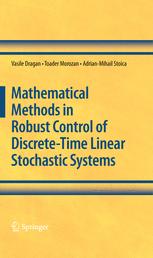

Most ebook files are in PDF format, so you can easily read them using various software such as Foxit Reader or directly on the Google Chrome browser.
Some ebook files are released by publishers in other formats such as .awz, .mobi, .epub, .fb2, etc. You may need to install specific software to read these formats on mobile/PC, such as Calibre.
Please read the tutorial at this link: https://ebookbell.com/faq
We offer FREE conversion to the popular formats you request; however, this may take some time. Therefore, right after payment, please email us, and we will try to provide the service as quickly as possible.
For some exceptional file formats or broken links (if any), please refrain from opening any disputes. Instead, email us first, and we will try to assist within a maximum of 6 hours.
EbookBell Team

5.0
88 reviewsIn this monograph the authors develop a theory for the robust control of discrete-time stochastic systems, subjected to both independent random perturbations and to Markov chains. Such systems are widely used to provide mathematical models for real processes in fields such as aerospace engineering, communications, manufacturing, finance and economy. The theory is a continuation of the authors’ work presented in their previous book entitled "Mathematical Methods in Robust Control of Linear Stochastic Systems" published by Springer in 2006.
Key features:
- Provides a common unifying framework for discrete-time stochastic systems corrupted with both independent random perturbations and with Markovian jumps which are usually treated separately in the control literature
- Covers preliminary material on probability theory, independent random variables, conditional expectation and Markov chains
- Proposes new numerical algorithms to solve coupled matrix algebraic Riccati equations
- Leads the reader in a natural way to the original results through a systematic presentation
- Presents new theoretical results with detailed numerical examples
The monograph is geared to researchers and graduate students in advanced control engineering, applied mathematics, mathematical systems theory and finance. It is also accessible to undergraduate students with a fundamental knowledge in the theory of stochastic systems.